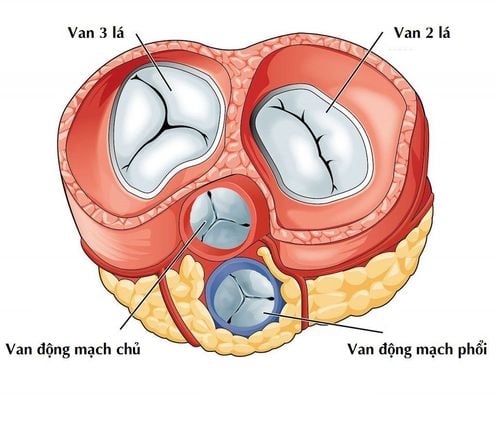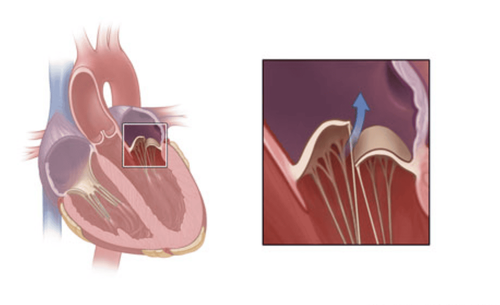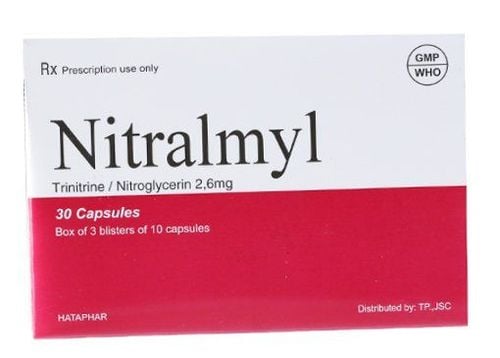This is an automatically translated article.
The article is professionally consulted by Master, Doctor Hoang Thi Hoa - Cardiologist - Department of Medical Examination and Internal Medicine - Vinmec Ha Long International General Hospital.Although mitral valve prolapse is a disorder that will follow the patient for life, not everyone develops specific symptoms. There are cases where patients only find out they have mitral valve prolapse when they are diagnosed.
1. What is mitral valve prolapse?
Mitral valve prolapse (also known in English as MVP - Mitral Valve Prolaspe) is a condition in which one or both valve leaflets are damaged and inflated, protruding into the left atrium when the left ventricle contracts. Thus, when the heart has to squeeze to eject blood, a small amount of blood will leak back into the left atrium, leading to mitral regurgitation.In most cases, mitral valve prolapse is not life-threatening and does not require treatment. However, mitral valve prolapse causes anemia to other organs which can lead to shortness of breath, chest pain, fatigue,...
Mitral valve prolapse is also known by other names such as:
Floppy valve syndrome Mitral valve aneurysm Barlow's syndrome
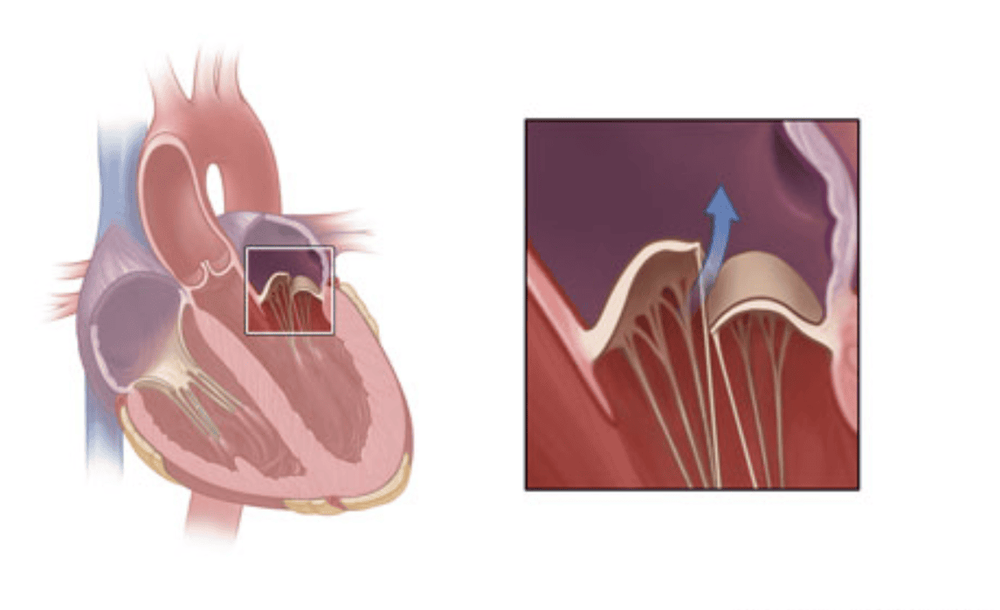
Hội chứng Barlow
2. Subjects often suffer from mitral valve prolapse
Mitral valve prolapse is a fairly common cardiovascular disease. Statistics show that women are more likely to suffer from this disease than men. Patients can consult their doctor about risk factors to limit their chances of getting the disease.3. Causes of mitral valve prolapse
When the heart is working properly, during the contraction of the left ventricle, the mitral valve will close completely to prevent the backflow of blood into the left atrium. However, in people with mitral valve prolapse, the leaf tissue of the mitral valve bulges into the left atrium like an umbrella each time the heart contracts.
Valve flaps make the valves unable to close tightly. Blood then flows back through the valve, a phenomenon called mitral regurgitation. If only a small amount of blood flows back into the atria, it should not cause serious problems. In more severe cases, there may be some symptoms such as fatigue, dizziness, shortness of breath or cough.
When a doctor uses a stethoscope to listen to the heart of a person with mitral valve prolapse, they will usually hear a click, followed by a murmur due to blood flowing back into the atria.
Mitral valve prolapse is a disease that can run in families. In addition, there are a number of other causes leading to mitral valve prolapse such as:
Polycystic kidney disease in adults Scoliosis scoliosis Ebstein anomaly Marfan syndrome Ehlers-Danlos syndrome
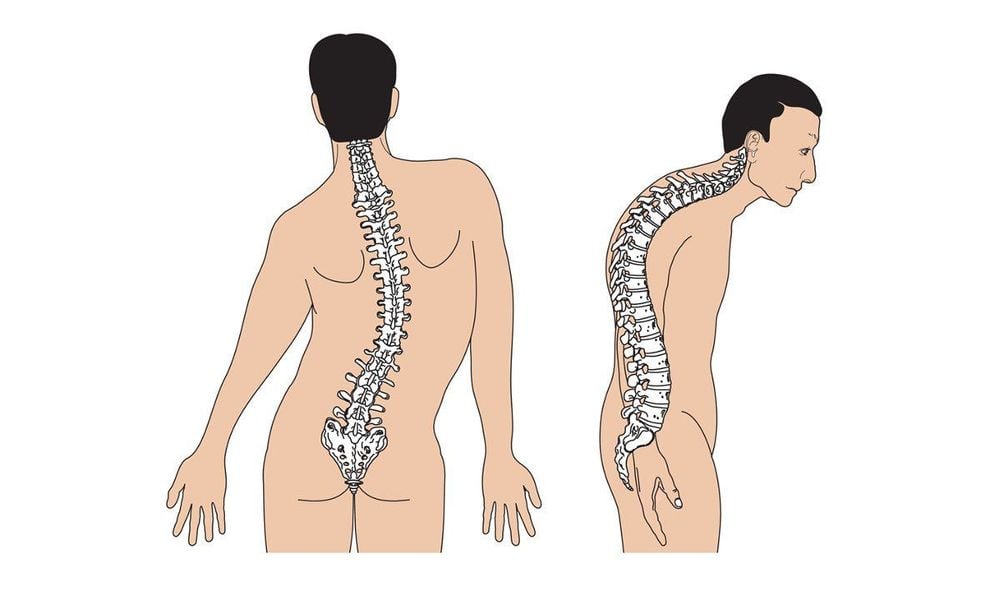
Cong vẹo cột sống
4. Common symptoms of mitral valve prolapse
Although mitral valve prolapse is a disorder that will follow the patient for life, not everyone develops specific symptoms. There are cases where patients only find out they have mitral valve prolapse when they are diagnosed.
Others have symptoms, but it is still difficult to accurately diagnose the disease. These symptoms may vary from patient to patient. There is a tendency to be mild at first and develop gradually later, such as:
Dizziness, migraines, Fatigue, Shortness of breath during physical activity or lying down Chest pain Arrhythmia or heart palpitations Atrial arrhythmias There are also some other symptoms not mentioned. If the patient experiences any of the above symptoms, they should see a doctor for examination and advice as soon as possible. Once a doctor has diagnosed mitral valve prolapse, if symptoms worsen, the patient should also see a doctor immediately.

bệnh sa van 2 lá gây mệt mỏi cho người mắc
5. Complications of mitral valve prolapse may occur
Most patients with mitral valve prolapse do not experience any complications. Often complications only occur in middle-aged or elderly people. May include:
Mitral regurgitation: This is the most common complication. People who are overweight or have high blood pressure are more likely to have this condition. If mitral regurgitation is severe, the patient should undergo surgery to repair or even replace the valve, in order to minimize the development of complications such as heart failure. Cardiac arrhythmias: Abnormalities of the heart rhythm are common in people with mitral valve prolapse, especially in the upper chambers of the heart. Although this condition is not life-threatening, it can cause discomfort to the patient. Endocarditis (or heart valve infection): Mitral valve prolapse increases the risk of bacterial endocarditis.

Người bệnh tim mạch nên gặp bác sĩ để được tư vấn và điều trị sớm
For timely diagnosis and treatment, patients should go to medical facilities to see a doctor as soon as there is any suspicion of mitral valve prolapse.
To protect heart health in general and detect early signs of myocardial infarction and stroke, customers can sign up for Cardiovascular Screening Package - Basic Cardiovascular Examination of Vinmec International General Hospital . The examination package helps to detect cardiovascular problems at the earliest through tests and modern imaging methods. The package is for all ages, genders and is especially essential for people with risk factors for cardiovascular disease.
Master. Hoang Thi Hoa has more than 10 years of experience in the field of Cardiology, especially in the field of cardiovascular emergency and echocardiography. Doctor Hoa used to be the Deputy Head of Cardiology Department of Quang Ninh General Hospital before working at Vinmec Ha Long International Hospital.
If you notice unusual health problems, you should visit and consult with a specialist.
MORE
Mitral valve disease Treatment of tricuspid valve disease through minimally invasive open heart surgery with laparoscopic support Repair and replace mitral valve through minimally invasive open heart surgery
Please dial HOTLINE for more information or register for an appointment HERE. Download MyVinmec app to make appointments faster and to manage your bookings easily.




